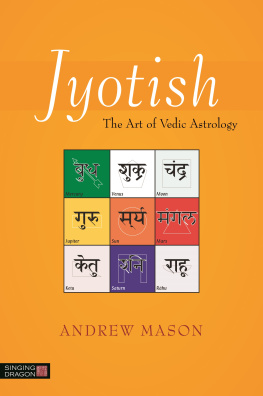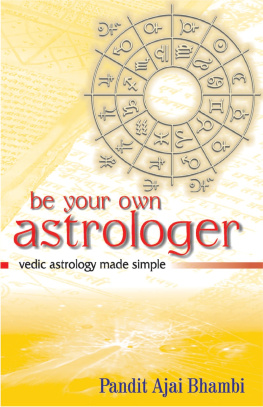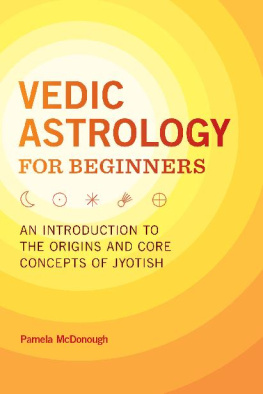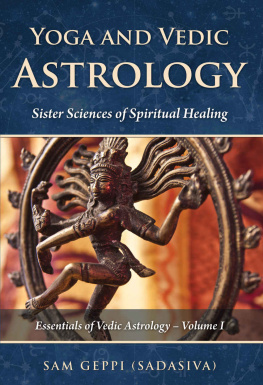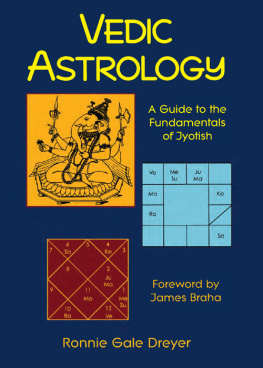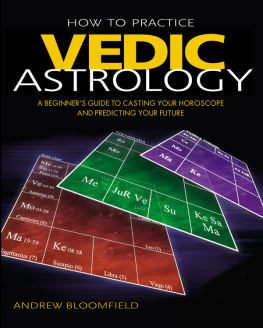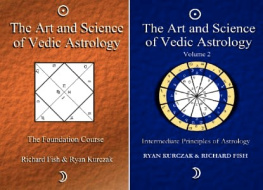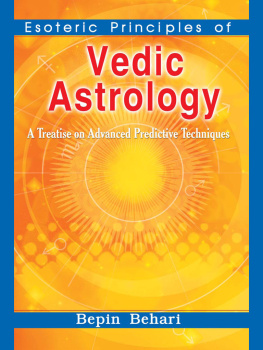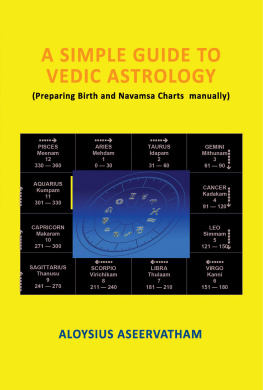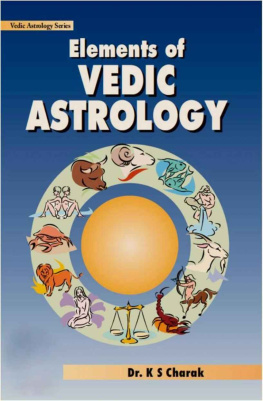Mason Andrew - Jyotish - the art of vedic astrology
Here you can read online Mason Andrew - Jyotish - the art of vedic astrology full text of the book (entire story) in english for free. Download pdf and epub, get meaning, cover and reviews about this ebook. year: 2017, publisher: Jessica Kingsley Publishers, genre: Religion. Description of the work, (preface) as well as reviews are available. Best literature library LitArk.com created for fans of good reading and offers a wide selection of genres:
Romance novel
Science fiction
Adventure
Detective
Science
History
Home and family
Prose
Art
Politics
Computer
Non-fiction
Religion
Business
Children
Humor
Choose a favorite category and find really read worthwhile books. Enjoy immersion in the world of imagination, feel the emotions of the characters or learn something new for yourself, make an fascinating discovery.
- Book:Jyotish - the art of vedic astrology
- Author:
- Publisher:Jessica Kingsley Publishers
- Genre:
- Year:2017
- Rating:4 / 5
- Favourites:Add to favourites
- Your mark:
- 80
- 1
- 2
- 3
- 4
- 5
Jyotish - the art of vedic astrology: summary, description and annotation
We offer to read an annotation, description, summary or preface (depends on what the author of the book "Jyotish - the art of vedic astrology" wrote himself). If you haven't found the necessary information about the book — write in the comments, we will try to find it.
Jyotish - the art of vedic astrology — read online for free the complete book (whole text) full work
Below is the text of the book, divided by pages. System saving the place of the last page read, allows you to conveniently read the book "Jyotish - the art of vedic astrology" online for free, without having to search again every time where you left off. Put a bookmark, and you can go to the page where you finished reading at any time.
Font size:
Interval:
Bookmark:

Jyotish
The Art of Vedic Astrology
ANDREW MASON
Foreword by James Braha

LONDON AND PHILADELPHIA
CONTENTS
20.8 Grahas, Rashis and Nakshatra Purua planets, stars
and bodily divisions
FOREWORD
For scholarly astrologers, Jyotish: The Art of Vedic Astrology is one of the most important books of the last four decades. It is an encyclopaedic text providing the origins of the myriad body of ancient Indian astrological techniques, and a real contribution to our field. It is enormously detailed and spectacularly researched. This is a book that will thrill academic-minded Vedic astrologers who want to dig deeper into every facet of the miraculous star language.
Anyone expecting an ordinary introductory book will, I dare say, be disappointed. And, in any case, there are now enough introductory texts written by both Westerners and Easterners to satisfy all tastes. The material you are about to read is not ordinary because Andrew Mason is as far from an ordinary astrologer as anyone I have ever met. He is passionate about metaphysics, determined in his ways, and driven to find the truth and historical accuracy of all astrological material.
Unlike the focus of my work and writing, which has been generally to determine which techniques work the best and which fall short so we can produce the most accurate horoscope readings possible, Andrew wants to discover the roots and very basis of all astrological knowledge. What, for example, are the origins of gemstones as remedial measures, and when were gems first mentioned in ancient texts? What is the basis for planetary Upayes (healing methods)? How are planetary yagyas performed, and are they more powerful than talismans, yantras or other methods? Which ancient texts appear most trustworthy, and are their statements borne out by direct observations of the skies? What does Srya Siddhnta say and why? What did Varhamihira conclude?
Andrew, to be frank, is very nearly a questioning machine who has actually had to learn to manage his unrelenting curiosity and drive for answers in order not to offend teachers and mentors. From Andrews view, no astrological knowledge or technique should be blindly accepted without some solid historical basis and proven logic or at least before given serious deliberation. This has not always sat well with Andrews teachers, for many different reasons. But it is this intense drive that is responsible for the detailed and intricate information you are about to read, and the reason Andrew addresses so many issues mathematical, technical and theoretical that are so often ignored or treated superficially by others.
Upon first reading this book, I called Andrew to discuss what was, for me, an overwhelming amount of detailed, technical material. I asked whether he felt he might have included too much information. To my surprise, his response concerned his fear that he had short-changed the reader by not including enough! Therein, of course, lies the beauty of this text for those who want to delve deeper than ever before. Not only is there an enormous amount of information, the work is detailed and meticulous.
Like many astrologers, Andrew came upon the star language in a roundabout way. In his twenties, he was plagued with a painful injury and spent 12 years seeking a cure. This led him to yurveda, the Hindu healthcare method that incorporates Jyotish, which grabbed him so profoundly that he opted to study in r Lak on a one-year internship, longer than the three-month requirement. Eventually, as happens to many yurvedic students, a fascination with astrology took hold and never let go.
This book is divided into five major sections, and I would love to point to the best, most fascinating, one. The task, however, is impossible. Every section is more intricate and insightful than the next. When asked for his opinion, Andrew said he favours the section on Upayes, healing methods. As he explained, Everyone has aspects of their horoscopes that are challenging. What good is Jyotish if it doesnt provide cures and ameliorations? I agree completely, and have argued for decades that too many Westerners practicing Vedic Astrology ignore or downplay astrological Upayes. But, to the question of which part of this book is best, the answer must be based on each readers particular interest. Because, as you will soon see, each section is like a book unto itself.
To say that the field of Jyotish is vast is an understatement, especially in Eastern astrology, where there are techniques, methodologies and systems that one could easily study beyond the length of one lifetime. To make matters worse, disagreements, complexities and conundrums abound. In India, at the front of many temples sit two lions, as if guarding the door. The lions are said to represent the two issues which stop disciples from what the temple has to offer God. The two issues are doubt (that God exists) and paradox (that which appears contradictory or impossible and yet is true). If one intends to approach anywhere near a mastery of Jyotish, he or she absolutely must embrace paradox, and make peace with a significant level of confusion.
The first problem occurs when an astrologer tries to analyse the charts of twins who are born within seconds, or a minute or two, of each other. The horoscopes are near exactly the same (including, quite often, the major Varga charts Navamsha D-9 and Dasamsha D-10) yet the two lives are dramatically different. The careers diverge, one twin divorces while the other is happily married, one is extroverted, the other somewhat shy, and so on (I am aware that some astrologers cite the Shastiamsha ( D-60) Varga chart as significant for twins, but the D-60 has absolutely nothing to do with career or marriage, to name only two major life conditions). We know from experience that astrology works. So, what gives?
The next problem occurs about five to ten years into our practice, when, if we are truly honest with ourselves and diligent in our work, we come to realise that no one astrological feature works 100 per cent of the time, no matter how definitive the indication. I am referring to planets in their highest degree of exaltation, without afflictions or bad aspects from other planets, giving mediocre or poor results rather than what they should produce. Or very badly aspected planets that once in a great while produce quite positive effects. I am not, to be clear, unaware that certain features of a horoscope can unduly influence the tenor of an entire horoscope, thus rendering other features less effective. We all know that if Saturn, for example, sits on the ascendant or tightly aspects many planets, the whole chart is affected and the person may fail to realise many of the positive features. Nor am I ignoring horoscope-altering techniques such as Neechabhanga and other important yogas. Those are obvious explanations. I am addressing relatively ordinary horoscopes where a profoundly positive or profoundly negative indication simply falls completely flat. In over 35 years of practice, I have witnessed this odd and rare phenomena a few too many times. Quite simply, there is not one definitively powerful positive or negative feature in all of astrology that, if we are honest, we have not seen utterly fail at least a few times. Why does this happen?
Next comes the issue of different astrological systems sometimes contradicting each other or indicating dramatically different outcomes. In the fall of 1992, about three or four months before my second marriage, an interesting thing happened. Using the most popular and widely used Jyotish system, Parasara, I could not find any indications whatsoever of my upcoming wedding. Nor could I find any such indications in my Western horoscope transits or progressions. Yet, I was sure I would marry. One day the phone rang and my friend Richard Houck, author of several Hindu astrology books and someone who also used Western solar, primary and lunar progressions, called to tell me to stop making wedding plans because there was positively nothing indicating marriage! The call was shocking because Rick had a wonderful predictive track record. He lived near Washington, DC and consistently predicted political elections accurately. He also had a thriving professional astrology business, and actually rectified the horoscope of every single client he ever worked for. If several major events did not occur in the clients life at the time the horoscope indicated, he would back up the birth time or move it forward until the chart fit. If rectifying the birth time required a big time change to produce accuracy, he refused to read the chart until the person did more research on their birth data.
Next pageFont size:
Interval:
Bookmark:
Similar books «Jyotish - the art of vedic astrology»
Look at similar books to Jyotish - the art of vedic astrology. We have selected literature similar in name and meaning in the hope of providing readers with more options to find new, interesting, not yet read works.
Discussion, reviews of the book Jyotish - the art of vedic astrology and just readers' own opinions. Leave your comments, write what you think about the work, its meaning or the main characters. Specify what exactly you liked and what you didn't like, and why you think so.

